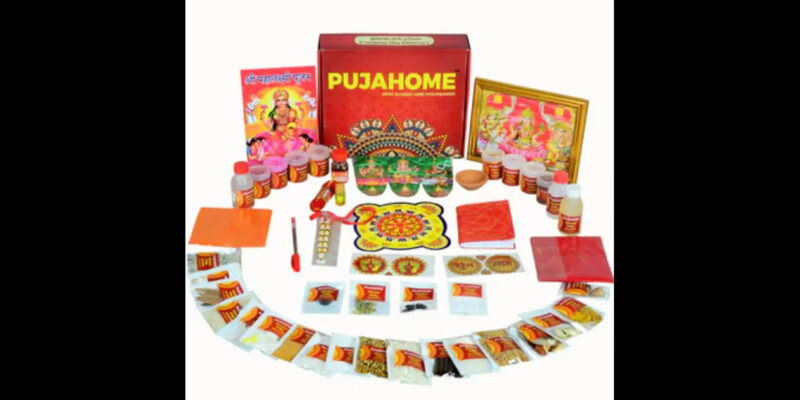
Diwali, the Festival of Lights, is one of the most celebrated and cherished festivals in India and among Indian communities worldwide. It symbolizes the victory of light over darkness, knowledge over ignorance, and good over evil. Central to this celebration is the Diwali pooja, a ritualistic worship of deities that involves specific items and preparations. A well-prepared pooja kit can significantly enhance your Diwali celebrations, ensuring you have all the essentials to create a spiritually enriching experience.
Understanding the Significance of Diwali Pooja
Before diving into the specifics of a Diwali pooja kit, it’s essential to understand the importance of the pooja itself. The rituals during Diwali typically honor Goddess Lakshmi, the deity of wealth and prosperity, and Lord Ganesha, the remover of obstacles. The pooja serves to invoke blessings for a prosperous year ahead, ensuring that homes are filled with light, joy, and abundance.
Components of a Complete Diwali Pooja Kit
A complete Diwali pooja kit encompasses a variety of items needed to perform the rituals effectively. Here’s a detailed look at what you should include:
1. Pooja Thali
The centerpiece of any pooja is the pooja thali, a decorative plate that holds all the essential items for worship. A traditional thali often features intricate designs and is made from metal or decorative materials. It usually contains a small idol or picture of deities, candles or diyas, incense, and sweets.
2. Diyas and Candles
Lighting diyas (oil lamps) and candles is a significant part of Diwali. They symbolize the victory of light over darkness. A complete pooja kit should include earthen diyas or decorative candles, along with oil or ghee for lighting. Consider including colorful tea lights for added vibrancy.
3. Incense Sticks and Holders
Incense sticks (agarbattis) add a fragrant ambiance to the pooja area. The aroma is believed to purify the surroundings and enhance the spiritual atmosphere. Ensure your kit includes a variety of incense sticks along with a holder for safe burning.
4. Rangoli Colors
Creating rangoli, intricate designs made on the floor with colored powders, is a popular tradition during Diwali. Your pooja kit should include rangoli colors or flower petals to decorate your entrance and pooja area, welcoming prosperity into your home.
5. Offerings for the Deities
A Diwali pooja is incomplete without offerings. Include items such as:
- Fruits: Fresh fruits symbolize abundance.
- Sweets: Traditional sweets like laddus, barfis, and kheer are offered to the deities.
- Nuts: A mix of nuts represents health and wealth.
- Flowers: Fresh flowers enhance the aesthetic and spiritual appeal of the pooja.
6. Prayer Book and Aarti
Include a prayer book containing Diwali prayers and aarti (hymns) dedicated to Goddess Lakshmi and Lord Ganesha. This will help guide you through the rituals and ensure you don’t miss any essential prayers.
7. Kalash and Rice
A kalash (pot) filled with water and topped with a coconut is a symbol of abundance. You should include rice to fill the kalash, representing wealth and prosperity. The kalash is often placed at the center of the pooja thali.
8. Puja Samagri (Puja Materials)
Puja samagri includes essential materials required for the rituals. This can consist of:
- Kumkum: A red powder used for marking the forehead and offerings.
- Chawal: Raw rice to be offered during the pooja.
- Moli or Kalava: Sacred thread used to tie around the wrist or to mark the deities.
9. Decorative Items
To create an inviting atmosphere, consider adding decorative items such as:
- Torans: Colorful door hangings made of flowers or beads.
- Fairy Lights: String lights to brighten up your pooja area.
- Traditional Diyas: Beautifully painted diyas can add a personal touch.
10. Personal Touches
To make your Diwali pooja kit unique, consider adding personal items like:
- Family Photos: Pictures of family members can be placed on the thali.
- Personalized Messages: Write down wishes for the coming year on decorative paper and include them in the kit.
Setting Up for the Pooja
Once you have assembled all the components, it’s time to set up your pooja space. Choose a clean, quiet area in your home where you can focus on the rituals. Decorate the space with flowers, rangoli, and lights. Arrange your pooja thali centrally, ensuring that all items are easily accessible.
Preparing Yourself Mentally and Spiritually
Before starting the pooja, take a moment to calm your mind and set your intentions for the rituals. It’s a time for reflection and gratitude, so consider meditating or reciting affirmations to invite positive energy.
Performing the Pooja
Follow the sequence of the rituals as outlined in your prayer book. Begin with the invocation of Lord Ganesha, followed by the prayers to Goddess Lakshmi. Light the diyas and incense, offer your chosen items, and conclude with the aarti. Remember, the sincerity of your devotion is what truly matters.
Conclusion
A complete Diwali pooja kit not only enhances the festive experience but also ensures that you have everything you need to perform the rituals with ease and joy. By carefully selecting items that hold personal significance, you create a pooja space filled with love, light, and spiritual richness. As you celebrate this Diwali, may your home be filled with blessings, prosperity, and happiness, bringing you closer to your family and traditions. Happy Diwali!










